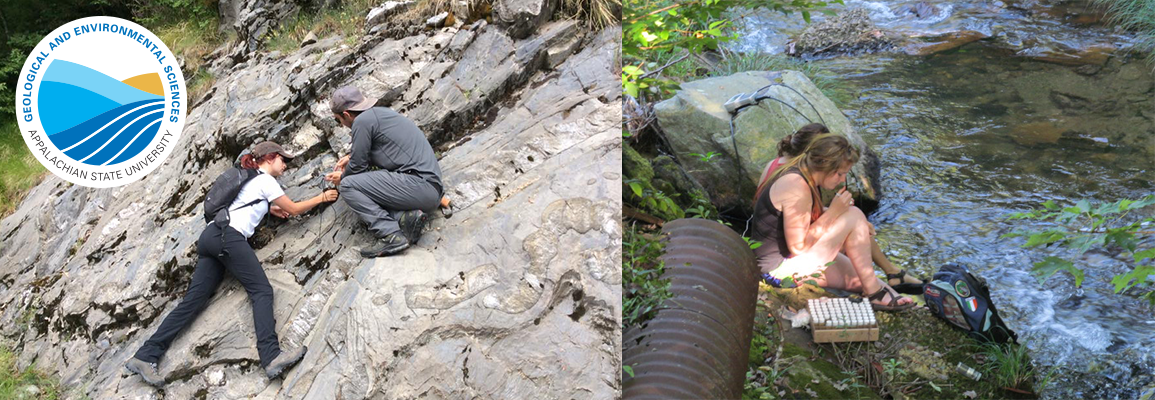More than 40% of the GES department are transfer students. Based on their experiences, we do not recommend that students transfer into our program with a completed Associates Degree (either via Community College or Early College)... regardless of what parents or high school counselors say. Here's why:
- It is difficult to graduate on time:
- Nearly all transfer students with a completed Associates Degree spend more than two years completing a GES degree at Appalachian. In our experience as advisors, students with an Associates Degree who attempt to graduate within two years find the process deeply stressful and exhausting. Although it may seem like a good idea to enter Appalachian's Geological and Environmental Sciences program with a completed Associates Degree, there are prerequisites and scheduling issues that make it unlikely for students who already have an Associates Degree to graduate in a timely manner.
- Nearly all of our upper level classes have a significant number of prerequisites. In addition, required classes in other departments also have numerous pre-reqs (particularly writing courses as well as Geography, Biology, Chemistry, Math, and Physics courses).
- Transfer students who arrive without having taken required introductory courses in calculus, chemistry, and physics can expect to spend a minimum of three years at Appalachian getting their degree (including summer classes), regardless of how much transfer credit they have.
- Your GPA will probably not be as good:
- Only grades received at Appalachian count in your GPA. This is often detrimental to transfer student's GPAs, because although transfer courses and credits are shown on a transcript, the grades received from these transfer courses are not counted in a student's GPA.
- Students with their Associates Degree completed at the time of entrance are not required to take General Education classes or many electives. This is usually quite challenging for transfer students in the Geological and Environmental Sciences, who find themselves immediately thrown into a concentration of upper level lab classes that they must take all at the same time.
- It is harder to develop a social and professional cohort:
- If you come into the GES department earlier in your career, you'll have better rapport and familiarity with faculty and staff, and get to know your classmates early on.
- If you spend more time here, you will have far more opportunities to develop research projects with professors (including a possible senior thesis and/or presentations at professional meetings), and create a network of colleagues and mentors, or participate in extracurriculars and internships.
- Students who spend more time in the department leave with an enhanced peer support and job network.
So... instead of coming in with a completed Associates Degree and immediately juggling four upper level lab classes per semester and having no time for anything else, we recommend transferring to Appalachian earlier in your academic career so your schedule has more flexibility and your GPA has a bit more of a buffer against low grades.
Planning to transfer here?
- If you are currently at another school but are planning to transfer to Appalachian to major in Geology or Environmental Science, we strongly recommend taking the following equivalents prior to transferring, so you will be able to take a variety of upper level courses in the GES department upon arrival and graduate in a more timely manner:
- RC 1000 and RC 2001 (for all programs of study),
- CHE 1101/1110 and 1102/1120 (for all programs of study),
- MAT 1101 for all programs of study (and 1102 for certain programs of study),
- and if possible, PHY 1170/1160 (and PHY 1180/1161 for certain programs of study)
- Potential transfer students from out-of-state or four-year colleges should look at the Transfer Course Equivalency page in combination with the Four Year Guides for the major of interest.
- Potential transfer students from NC community colleges should look at the NC Community Colleges Transfer Guides:
- NC Community College transfer guides for majoring in Environmental Science (BS) - Natural Resources (coming soon)
- NC Community College transfer guides for majoring in Environmental Science (BS) - Quantiative Environmental Science (coming soon)
- NC Community College transfer guides for majoring in Environmental Science (BS) - Earth Systems Science
- NC Community College transfer guides for majoring in Geology (BS)
- NC Community College transfer guides for majoring in Geology (BA)
- NC Community College transfer guides for majoring in Geology (BS) - Environmental Geology
- NC Community College transfer guides for majoring in Geology (BS) - Quantitative Geoscience
- NC Community College transfer guides for majoring in Geology (BS) - Paleontology
- NC Community College transfer guides for majoring in Geology (BS) - Earth/Environmental Science Education
Useful links for transfer students:
- Appalachian's Office of Transfer Services
- Transfer Course Equivalency (will your coursework transfer as a specific course at Appalachian, or just as an elective?) - note that the GES Department cannot override the decisions of other departments about course equivalency.
- If you are a potential transfer student with questions that have not been addressed above (or in the transfer guides) please contact Dr. Steve Hageman (our department's Transfer Student faculty mentor). Please note: Dr. Hageman cannot provide individual transfer advising prior to enrollment, nor set up individualized campus visits. Please schedule visits through Admissions.
